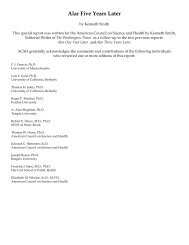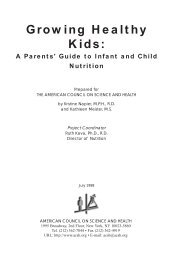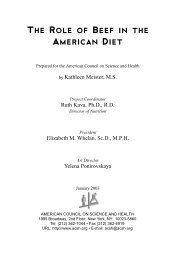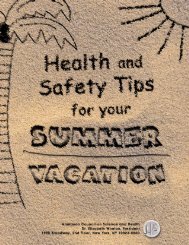Health and Safety Tips for Your Summer Vacation (Update 2010)
Health and Safety Tips for Your Summer Vacation (Update 2010)
Health and Safety Tips for Your Summer Vacation (Update 2010)
You also want an ePaper? Increase the reach of your titles
YUMPU automatically turns print PDFs into web optimized ePapers that Google loves.
Consider equipping your car with some disposable<br />
bags if you have a child who is prone to<br />
carsickness. There are other precautions you can<br />
take that may make these bags unnecessary. The<br />
Food <strong>and</strong> Drug Administration suggests the following:<br />
• Place yourself where there is the least motion:<br />
on deck <strong>and</strong> amidships on a ship, in the front<br />
seat in a car, <strong>and</strong> over the wing on a plane.<br />
• When traveling in a vehicle where seat belts<br />
are not necessary, lie on your back, in a semireclined<br />
position, <strong>and</strong> keep your head as still<br />
as possible. In an automobile, do this only to<br />
the extent possible without removing your seat<br />
belt. <strong>Safety</strong> must take priority over motion<br />
sickness prevention.<br />
• Do not watch the waves when in a boat or fastmoving<br />
scenery when on l<strong>and</strong>: keep your eyes<br />
fixed on the horizon.<br />
• Avoid intense chemical, food, fresh paint, <strong>and</strong><br />
tobacco odors.<br />
• Eat <strong>and</strong> drink in moderation (especially alcohol)<br />
the night be<strong>for</strong>e a trip.<br />
For those people <strong>for</strong> whom these simple preventive<br />
measures are not enough, there are both prescription<br />
<strong>and</strong> non-prescription medications available.<br />
Most of these are antihistamines, which<br />
work by blocking nerve signals between the<br />
inner ear <strong>and</strong> the brain’s nausea center. A nonoral<br />
treatment—in the <strong>for</strong>m of a dermal patch<br />
containing scopalamine—is now available by<br />
prescription. It can prevent nausea <strong>and</strong> vomiting<br />
<strong>for</strong> up to three days. The patch should be placed<br />
behind the ear at least four hours be<strong>for</strong>e its effects<br />
will be needed. It has not been shown to be safe<br />
<strong>for</strong> use by children, however, <strong>and</strong> should be used<br />
only with caution in elderly persons.<br />
Oral anti-motion sickness medicines work best<br />
when taken 30 minutes to an hour be<strong>for</strong>e traveling.<br />
If you wait until you start to feel sick be<strong>for</strong>e<br />
you take the pills, they probably will not have<br />
enough time to take effect. If you wait until you<br />
are really sick, the pills will suffer the same fate<br />
as your lunch.<br />
When buying over-the-counter remedies <strong>for</strong><br />
motion sickness, read the labels carefully. Some<br />
are unsuitable <strong>for</strong> children. All are unsuitable<br />
if you have certain medical problems or if you<br />
are the one who will be driving or piloting the<br />
vehicle in question (they cause drowsiness). It<br />
is dangerous to drink alcoholic beverages while<br />
using them, because alcohol intensifies the drugs’<br />
depressant effects. If you must take other medication,<br />
consult your doctor be<strong>for</strong>e using motion<br />
sickness remedies; some drugs should not be<br />
mixed because they magnify or antagonize each<br />
other’s effects.<br />
Travelers’ Maladies: Diarrhea<br />
International travelers must take food <strong>and</strong> water<br />
precautions to prevent stomach <strong>and</strong> intestinal<br />
problems caused by poor sanitation in developing<br />
areas of the world such as southern Asia; North,<br />
East, <strong>and</strong> West Africa; Latin America; <strong>and</strong> the<br />
Middle East. Called traveler’s diarrhea, the syndrome<br />
is also characterized by cramps, nausea,<br />
dizziness, <strong>and</strong> fever. It can last from three to 7<br />
days <strong>and</strong> affects 20-50% of short-term travelers.<br />
If you do get traveler’s diarrhea, the Centers <strong>for</strong><br />
Disease Control <strong>and</strong> Prevention <strong>and</strong> the National<br />
Institutes of <strong>Health</strong> advise travelers to take antibiotics<br />
only if absolutely necessary because they<br />
may cause additional problems.<br />
Initially, in the absence of high fever <strong>and</strong> blood in<br />
the stools, you can take an over-the-counter antidiarrheal<br />
medicine such as Imodium.<br />
Dehydration is a consequence of traveler’s diarrhea<br />
<strong>and</strong> can become a serious problem, especially<br />
<strong>for</strong> children <strong>and</strong> infants, so it is important<br />
to drink plenty of fluids such as soft drinks <strong>and</strong><br />
pure fruit juices (never any water or dairy products)<br />
coupled with a source of sodium chloride<br />
(e.g., salted crackers).<br />
If the diarrhea is still unresolved, <strong>and</strong>/or if yo<br />
have a high fever or blood in the stools, consult a<br />
physician. Often, they will prescribe antibacterial<br />
drugs (antibiotics) that help shorten the length of<br />
the illness. (Sometimes a physician will let you<br />
obtain this medication be<strong>for</strong>e leaving the country<br />
as a preventive measure, to be taken if you<br />
become very ill.) Antibiotics are very effective<br />
10










